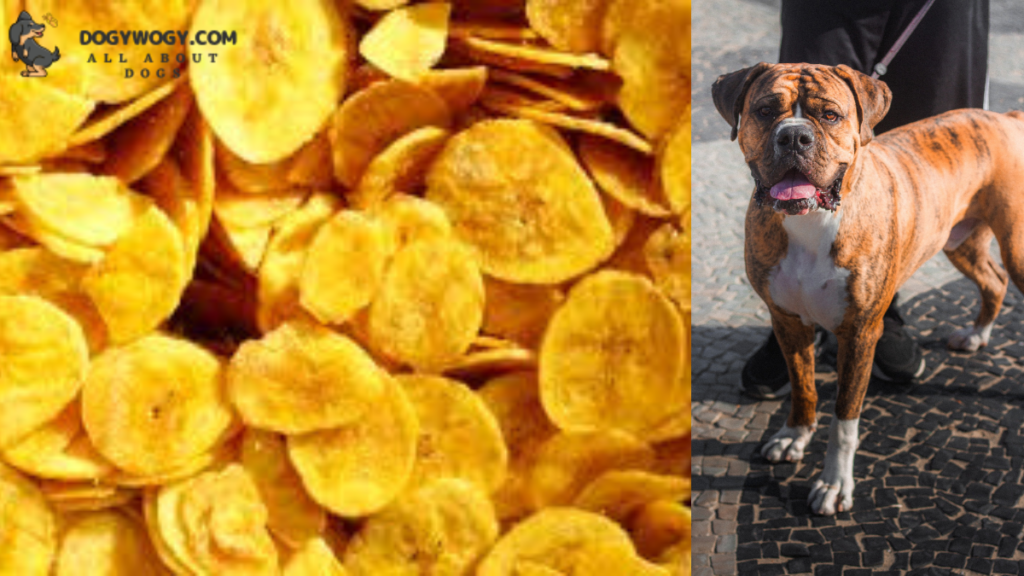We recognize the importance of caring for our furry friends to preserve their health and happiness. Treating them is one way to ensure their happiness, but caution is crucial since not all human foods suit them. A frequent inquiry about banana chips’ safety arises from dog owners concerned about the potential risks involved. This discussion aims to examine the nutritional aspects, as well as potential benefits and drawbacks, of banana chips for dogs. We aim to empower dog owners to make informed, thoughtful decisions for the health and happiness of their dogs by providing a comprehensive understanding of feeding banana chips to them.
Can Dogs Eat Banana Chips?
Dogs enjoy bananas as a healthy snack, but dehydrated fruit and banana-derived products, such as banana chips, present a different picture. The landscape is diverse, and its suitability for canine consumption depends on various factors. Dehydrated or dried fruit purchased from stores is often laden with sugar, fried in inflammatory oils, or includes banana peel particles. Dogs with sensitive stomachs, especially smaller breeds, can suffer from these elements. To mitigate these concerns, opt for homemade alternatives. By preparing dehydrated fruit chips at home, you can ensure they are free of excessive additives and processing.
Banana chips are certainly permissible for dogs, but moderation is the key. The chips provide a range of benefits, including dietary fiber, potassium, and vitamins B6 and C, all of which contribute to a dog’s health. In addition to being tasty, banana chips can provide a low-calorie energy boost to a dog’s stomach. Despite these advantages, portion control should be exercised with caution. A high fiber intake can cause digestive issues, including diarrhea and upset stomach. It’s best to share banana chips sparingly, providing small amounts now and then as a treat. A balanced approach to canine nutrition requires limiting servings to 4-6 slices at a time weekly when offering homemade banana chips.
Pros and Cons of Banana Chips for Dogs
Banana chips, which humans enjoy in various ways, have been debated as potential dog treats. Banana chips are versatile and easy to use in cereals, ice cream, salads, baked goods, chocolate dips, and spreads. Using these treats as substitute dog treats has sparked debates about their impact on canine health over time. Here are some pros and cons of using banana chips as a dog treat.
Pros
There is a high level of magnesium and fiber in banana chips. It helps your pet’s digestive system by supplying high fiber. Bananas contain magnesium, which helps your dog’s body absorb vitamins faster.
Regarding vitamins and potassium, banana chips are good sources of vitamins C, B6, and potassium. Your dog may benefit from these nutrients as a natural energy booster. Feeding your pet the treat during training or playing games will be a big help to them.
Related: Can Dogs Eat Banana Bread? Everything You Need to Know About
Besides being delicious and chewy, these dog treats are made artificially. Despite being made naturally without extensive industrialization, banana chips have a taste and chewiness that rival artificially produced dog treats.
Suppose you give your dog banana chips as treats when training or playing games with them; don’t forget that they are, first and foremost, a human snack. As a result, the good is fully utilized, and you and your dog both benefit.
Cons
Bananas contain sugar just like any other fruit. Sugar can cause weight gain, so it may also affect your dog. Your dog may develop other health problems if sugar is not monitored properly.
Fat is contained in banana chips since they are deep-fried in oil. Additionally, fat from oil can still cause your pet to gain weight unnecessarily, in addition to the sugar in the chips. It will not be dangerous for your pet unless the chips are baked or dehydrated upon production.
As a dog treat, the amount of consumption could be overlooked. You may incorrectly estimate the amount of chips your dog eats while training or playing games with him. Furthermore, you will likely forget the treat consumption if you enjoy time with your pet. While moderation is key, if the practice is unthinking, it may lead to an increased number of treats fed unknowingly. We all know that too much of anything can be harmful.
What Happens if My Dog Eats Too Many Banana Chips?
There are a few concerns related to excessive banana chip feeding, with sugar being the primary concern. In combination with high-fat foods, sugar can cause pancreatitis, a painful condition marked by inflammation of the pancreas. The symptoms of pancreatitis in dogs include recurrent vomiting, a hunched back, and loss of appetite. In acute cases, it resolves within a few days, but in chronic cases, it requires ongoing veterinary care and may require special diets. Another potential problem is stomach upset caused by excess fiber or potassium. Your dog’s health depends on potassium, but an overdose can have adverse effects, underscoring the importance of moderation.
Final Thoughts
In Conclusion, taking care of our dogs’ diets involves thoughtful consideration, especially regarding treats. Banana chips, a controversial dog treat, have both advantages and disadvantages. Although they are high in magnesium, fiber, vitamins C, B6, and potassium, offering benefits such as improved digestion and natural energy boosts, they also contain sugar and fat. Overconsumption can cause weight gain, pancreatitis, and stomach upset. To control additives and processing, homemade alternatives are recommended. It is important to avoid overindulging when eating banana chips due to their taste and chewiness. A balanced approach to canine nutrition, with 4-6 pieces weekly, promotes health and happiness in our furry friends.

